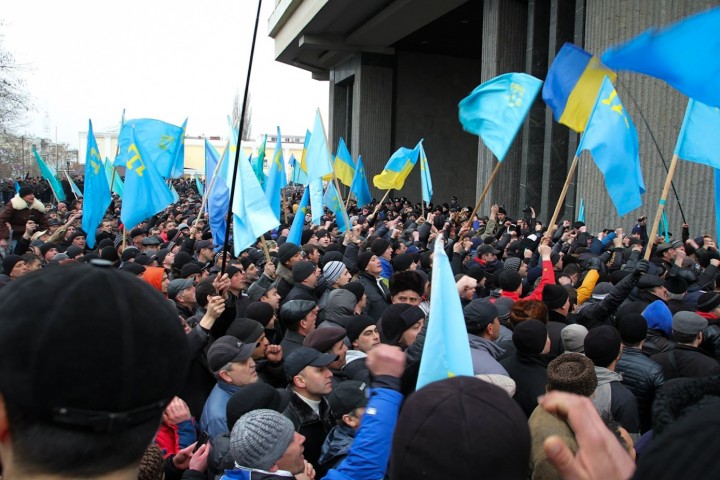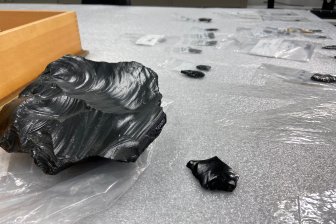WATCH: More than 10,000 Muslim Crimean Tatars rally in support of Ukraine’s interim leaders.

Violations of human rights and repression of human freedoms come to light once uninvited armed guests can bash anyone’s door in without invitation and invade people’s homes. It is a more grievous insult once these unwanted guests continuously invade your property over the years, manipulate and lie to you and your family and use every opportunity to instigate a conflict. That kind of behavior is not only unacceptable by any norms, but it also breaks all ethical grounds of human interaction.
For some reason, however, the line between right and wrong can become blurred once more than one family is affected. Then, it also becomes more than a mere private matter – but a political one, with terms like “geopolitics,” “separatism” and “conflict escalation” in the mix. This kind of jargon can be intentionally put in place to facilitate misunderstanding and to mask reality. In such a situation, people fail to see a bigger picture hiding behind smaller arguments. They forget about the aspect of human lives placed at stake.
“We are the minorities. We are also a peaceful group of people. We are not capable of, nor do we wish to, engage in an act of war. Though, in order to survive as a nation (which is too small to fight on their own) we are forced to accept and hear all the peaceful talks with all possible sides – whether with the Crimean authorities, the Ukrainian government officials, the USA congressmen, the German Chancellor Angela Merkel, President Obama, as well as Russia’s leader Mister Putin,” Osman Pashayev, a leading Ukrainian journalists within the Crimean Tatar community, recently wrote on his Facebook page. Pashayev expressed his opinion with regard to the leading situation in Crimea, saying that for the most part people lost a sense of understanding as to who is trying to save them and who is looking to take an advantage of them.
- Missing cat found in Amazon warehouse after being shipped in return box
- Sikh rally in Toronto with multi-party support prompts India diplomatic rebuke
- Gold watch owned by richest Titanic passenger sells for record-breaking $2M
- Kids watch in shock as bear devours ducklings, one by one, at Seattle zoo
According to 2001 Ukrainian census, the Crimean Tatars account for 12.1 per cent of the general population in Crimea – which comprises nearly two million people. Where as, the Ukrainian population constitutes 45 million and Russian Federation’s is close to 144 million. With that said, the loss of the Crimean peninsula’s autonomy would only mean loss of diversity in terms of territory, culture and language. For Crimean Tatars in particular Russia’s annexation calls for isolation, oppression and extinction. Or simply, it will be the beginning of an end.
In fact, historically, Russia’s treatment toward ethnic minorities has proven to be heinously unjust. Tatars vastly suffered at the hands of Russian rule twice before. Once, as they were persecuted after Russia seized Crimea in the 18th century. Later, during World War II, Joseph Stalin ordered a mass deportation of the Crimean Tatar population to Central Asia labour camps. Nearly 200,000 men, women and children were forced out of their homes and onto freight trains. Almost half of the population did not make it through the gruesome relocation.
After some twenty years, many Crimean Tatars have been able to return from exile. However, today, they are once again under threat of losing their lands to the Russian government. Once more, the indigenous population is being placed under Russia’s farce actions. Sadly, now in the 21st century, Tatars witness the repeating historical consequences – as Russia continues to enforce a total disregard for basic human rights.
Elvira Maksudova, a Toronto citizen of Crimean Tatar descent, is actively engaged in a battle for Crimea for over ten weeks now. Her family resides there. As many newcomers, she came here with her husband in the hopes to find a better life. Once the situation escalated back home, Maksudova became very concerned. In the midst of crisis, she faced two choices – either to fight and to provide support from here in a vivid way, or to purchase a flight ticket to Ukraine and to stand in the front line in defending her parents, friends and neighbours. “We remain as Ukraine, and we are committed to fighting for its unity, independence and sovereignty. Ukrainian people are so dear to our hearts, as they share our vision and values. We respect the Ukrainian nation very much, and we are proud to consider ourselves Ukrainian as well. We believe the Crimean peninsula will remain Ukraine. Mainly, that is the solely reason we need to keep fighting for and to continue believing in.”
Toronto’s Crimean Tatar community is not big, but it is organized. The members have made an effort to attend as many of the pro-Ukrainian rallies as they can. They have also been persistent in making sure the Canadian politicians hear their voices, as well as media and the general public in Toronto. In a similar way, the Tatars in Crimea were able to gather together more closely and to stand united, back-to-back, to protect their once-quiet peninsula.
Nevertheless, as Maksudova says, the Crimean Tatars are also afraid that provocations from pro-Russian side will increase and that tensions will eventually cause people to breakdown. “Our people are very afraid and are actually encouraged to remain quiet, as there is a belief that the so-called ‘skinheads’ will incite destruction of our nation with their lies and violence.” She underlined the importance of the international community’s involved in this regard, hoping for granted assistance and protection of her people.
“The most troubling thought in my mind is that Crimea will essentially become part of Russia! We are very well aware of what that is like.” Maksudova explained that during the years Crimea was under the rule of Russian tsars and later in the hands of Soviet Russia, her ancestors were widely discriminated against and were especially treated with cruelty. “Most brutal,” she said, “were the times of WWII, as the Crimean Tatars were entirely stripped off their property rights – whether to own land or a house. Most horrific was when they would bulldozer houses right in front of my grandparents’ eyes. My people were forced to exile.” Maksudova also fears that with the today’s Russia’s take over the Crimean peninsula, the native residents will once again be put in the position of having their property confiscated. “It is very simple,” she added, “those refusing to attain a Russian passport will have no right to possessions.”
The passport switch is not the only major change in Crimea. In addition, the region will change its national symbols from all administrative buildings (many of which were in the language of Crimean Tatars). The administrations themselves will undergo major restructuring, as most officials will be replaced with pro-Kremlin politicians.
There is not much choice left for those residing on the Crimean peninsula today. That is, those who consider themselves Ukrainian – they have the choice but to remain as an estranged minority and sit back quietly…or leave everything behind, everything they were able to establish over the fifty years. Maksudova’s family decided to stay put: “Since Crimea became occupied, my relatives never mentioned that they are afraid and that they feel the need to take off elsewhere. They said, ‘it is our land and we will not be going anywhere. Even if there is a threat of being killed.’” Recent polls show that over 84 per cent of the Crimean Tatars are determined to remain Ukrainian under no other circumstances than Crimea belonging to Ukraine. Thus, for the community scattered all over the world – the Crimean Tatars – are just starting to mobilize full force and will not give up on their homeland any time soon.
For the Crimean Tatars, a community neither big enough to defend themselves on their own – nor wanting to engage in conflict, their existence is vital. They are ready to accept any means to a resolution, which would provide protection of Tatar rights and would save their status for the Crimean Tatar language. At the same time, Crimea’s indigenous people will not surrender to Russian domination – as it threatens their community. Their community opposes separating from Ukraine, and they will continue to look for ways for Crimea to remain their ethnic homeland.





Comments